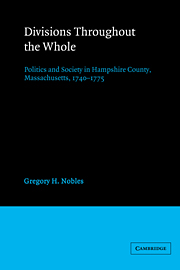Book contents
- Frontmatter
- Contents
- Preface
- Introduction
- 1 Family power and political relations in Hampshire County
- 2 The Hampshire County ministry and the Great Awakening: from revival to reaction
- 3 The revivalist removed
- 4 The legacy of religious dissent
- 5 New settlements in an unsettled society
- 6 The politics of parochialism
- 7 Revolution in the neighborhood
- Appendix
- Notes
- Bibliographical essay
- Index
1 - Family power and political relations in Hampshire County
Published online by Cambridge University Press: 30 September 2009
- Frontmatter
- Contents
- Preface
- Introduction
- 1 Family power and political relations in Hampshire County
- 2 The Hampshire County ministry and the Great Awakening: from revival to reaction
- 3 The revivalist removed
- 4 The legacy of religious dissent
- 5 New settlements in an unsettled society
- 6 The politics of parochialism
- 7 Revolution in the neighborhood
- Appendix
- Notes
- Bibliographical essay
- Index
Summary
From the beginning Hampshire County represented a sort of frontier paradox: although vast in area, it was still a very limited and restricted universe, almost a world unto itself. In 1636, the year the English inhabitants of Massachusetts Bay established their first college, a small group of white settlers created the first town on the far western end of the colony along the banks of the Connecticut River. The founding of Harvard both reflected and reinforced the dominance that Boston and its surrounding towns had–and would continue to have–in the affairs of the colony. But the founding of Springfield and the subsequent creation of Hampshire County represented the beginning of an alternative focus, the development of a new region of Massachusetts a hundred miles away from Boston. Within the first century of its growth, Hampshire County would become a distinct, coherent political entity governed by its own distinct, coherent political elite. There, probably more than in any other county in Massachusetts, the growth of authority in county institutions, both secular and ecclesiastical, tended to overshadow the local autonomy of individual towns and churches. Moreover, this regional authority also tended to flow through a few selected bloodlines, so that by the early part of the eighteenth century, political power in Hampshire County was defined and divided almost solely according to considerations of paternity and patronage.
- Type
- Chapter
- Information
- Divisions throughout the WholePolitics and Society in Hampshire County, Massachusetts, 1740–1775, pp. 12 - 35Publisher: Cambridge University PressPrint publication year: 1983



